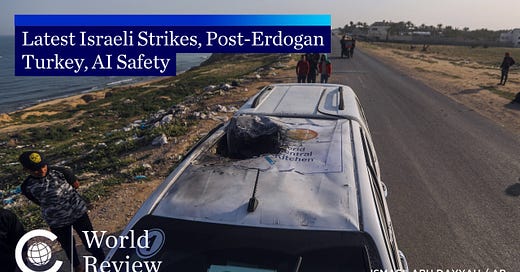World Review: Latest Israeli Strikes, Post-Erdoğan Turkey, AI Safety
A brief synopsis of this week's show
Each Friday morning, I host a video podcast called “World Review with Ivo Daalder” where three journalists from major news outlets around the world join me in discussing the latest global news stories of the week.
This morning, April 5, I was joined by Deborah Amos of Princeton University, Jamil Anderlini of Politico Europe, and Ryan Heath of Axios.
“World Review is always fascinating. I love the fact that you can get journalists from around the world to participate since zoom is the medium.”
— A Subscriber to America Abroad
While I encourage you to watch or listen to the episode (and subscribe wherever you get your podcasts!), here are a couple of interesting things I took away from our discussion :
Two Israeli missile strikes – one deliberate, the other mistaken – might quite possibly change the course of the war in the Middle East. Israel struck the Iranian consulate in Syria, killing 3 top Iranian Revolutionary Guard Corps leaders. Hours later, it fired three missiles at three cars carrying aid workers from José Andrés’s World Central Kitchen charity, which has delivered 43 million meals to Gazans since the beginning of the war. The killing of the aid workers produced outrage around the world, and let President Biden to call Prime Minister Netanyahu and demand Israel to change course by putting humanitarian needs first. Deb noted that Netanyahu was increasingly being squeezed, both from the outside by the United States and other countries and internally by a High Court ruling suggesting the government needed to do far more to feed a starving population. Israel responded by opening the port of Ashdod to aid shipments, opening the northern border crossing into Gaza, and allowing Jordan to ship more aid. For many, this was all too little, too late. For Biden, only results on the ground will truly matter.
A surprise election in Turkey, where the opposition swept Recep Tayyip Erdoğan’s AKP party from power across local elections. Even more notable was the fact that Erdoğan seemingly accepted the results, which he hadn’t done the last time his AKP lost the mayoral contest in Istanbul and Ankara. Jamil added a note of caution, suggesting that it was still too early to know whether Erdoğan would truly accept the results. The victor in Istanbul, the highly popular opposition leader, Mayor Ekrem Imamoğlu, remains under indictment in trumped-up corruption charges, giving Erdoğan a possible way out of accepting the wishes of the voters. On the other hand, when authorities tried to remove a victor of the Kurdish party from his newly won mayoral seat in Van, eastern Turkey, a public outcry led to a quick reversal, allowing the new mayor to be seated. In other words, there may still be hope for People Power in Turkey.
Finally, we looked at the new world of AI – and the efforts by governments to try and create a regulated governing space in which these new technologies need to operate. The EU passed regulations that went into effect last month, and this week the United States and Britain signed the first international agreement to coordinate on ensuring the safety of AI. Ryan struck an optimistic tone, saying governments were responding to the potential challenges posed by this latest technology in ways none had when new apps and social media exploded onto the scene fifteen years ago. Part of the reason was that the technology developers themselves were more aware of the potential dangers of the new technology and actively seeking to prevent that from occurring. For another, governments were more inclined to take regulatory steps than they had been before. And, finally, while the speed of AI development was extraordinary, the possibility of any of these systems developing the robot-like quality of generative AI was, Ryan contended, still some time off.
That’s it for my quick takes of this week’s episode here on America Abroad. To get the full flavor, please listen to the episode itself.





